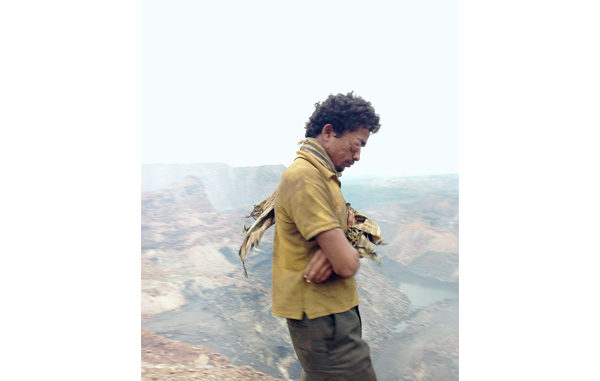
Ronny Sen
I
was working in Jharia as a fixer for French filmmakers Tiane Doan Na Champassak and Jean Dubrel.
The underground fire in Jhariacoal fields (in Dhanbad Jharkhand state, India) has been burning for more than a hundred years now. People who inhabit that space have seen this since their birth. Many villages which were once thriving with life don’t exist anymore. They have simply vanished. While some people have left these areas and shifted elsewhere for better jobs and opportunities in other cities, there is a large population which calls Jharia home and keeps on shifting along the blasting mines. Economically, they are largely dependent on this huge coal industry. They don’t have any other skills. So, even if there is fire and subsidence they don’t have any other choice but to keep moving along the mines.
Various small and at times extremely ambitious projects were initiated to rehabilitate these people affected by the fire and subsidence, but nothing substantial has been achieved thus far.Some houses were built for some of these effected people as a part of the rehabilitation and resettlement project which were far away from the mines. The one room apartments were extremely small for these families, and there was no livelihood opportunity for them. So, people who were shifted started moving back to different mines again.
This is a place where historically literally everyone has failed, the Maharajas, the British Raj, the Government of India, the Communists, the Mafia, and now is the turn of the multinationals who will also eventually fail.
I have imagined this space to be at the end of the world after everything has been extracted. What remains after that is what I am interested in.
I want to share my concerns with a larger audience; the story is not specific and limited to India at all. It is just a coincidence that Jharia exists. It’s an economic, environmental and deeply political problem which is predominantly visible all across the world.
There are many areas which I am trying to touch upon with this body of work. The fact is that it’s a complex issue. It doesn’t only deal with mining but how it is done and with the people who are most affected and so on. I hope that this can initiate a dialogue and offer people a small glimpse of a possible future.
![]()
![]()
![]()
![]()
![]()
![]()
![]()
![]()
![]()
![]()
All photographs © Ronny Sen from:
![]()
END OF TIME
Nazar Photography Monographs 04
Photographs: Ronny Sen
Hand-signed limited edition of 500
Hard cover with slipcase
96 pages, 89 plates | 15 X 20 cm | 6 X 8 in
Editor: Sanjeev Saith
Designer: Gopika Chowfla
Publisher: Nazar Foundation
Publication date: March 2017
Price: 1500 INR
Write to publications@nazarfoundation.org to book your copy of this limited edition book.
About the book
End of Time by Ronny Sen is the 4th title in the Nazar Photography Monographs. Based on his award winning work of the devastation caused by the Jharia coal fires in Eastern India, the book is an unflinching and harsh reminder of how greed can adversely impact the environment and its inhabitants. The work was awarded the Getty Instagram Grant in 2016.
About Nazar Photography Monographs
We believe that important photographic works must be seen as books whether they are commercially viable or not. Each monograph, featuring a photographer’s work on a single subject / theme, is beautifully produced, but priced reasonably to make the work more accessible.
Previous titles are:
KANU’S GANDHI by Kanu Gandhi (Nazar Photography Monographs 03)
Hardcover | 150 pages | 92 plates | ₹3000
When Abba was ill by Adil Hasan (Nazar Photography Monographs 02)
Hardcover | 106 pages | ₹ 1000
Home. Street. Home. by Vicky Roy (Nazar Photography Monographs 01)
Soft cover | 114 pages | ₹ 1000
Ronny Sen (1986) was born in Silchar, Assam. In the early 90’s, he moved with his family to Salt Lake City in Calcutta where he still lives and works. He made his first artist book titled Khmer Din in 2013. Sen represented India at the World Young Artists Event in Nottingham (2012) and was the recipient of the Jenesys Creators’ Programme for an artist residency in Japan, on invitation by The Japan Foundation (2012). His work was part of the exhibition In Secrecy at the Art Heritage gallery (2011). He was invited for a masterclass at the University of California in Berkeley and won the first prize at the MFI Awards (2014). Sen has photographed the Indian General Elections in 2014 for the United Nations and Fabrica, Italy. In 2015, the Polish Institute invited him to be an artist-in-residence in Poland which resulted in two solo residency exhibitions at gallery Tarq in Bombay and Latitude 28 in New Delhi. His works were part of the exhibition Abandon, presented by the Gujral Foundation (2015). His photographs are included in the permanent collection of the Alkazi Collection of Photography. In the year 2016, he won the Getty Images Instagram Grant for his work End of Time in the Jharia coal mines, which were exhibited at Noorderlicht Festival’s show Arena at the Belvedere Museum, Netherlands and at Photoville in New York. He published is second book End Of Time with Nazar Monographs in 2017. He is working on his next book and his first feature film Cat Sticks.

Leave a Reply